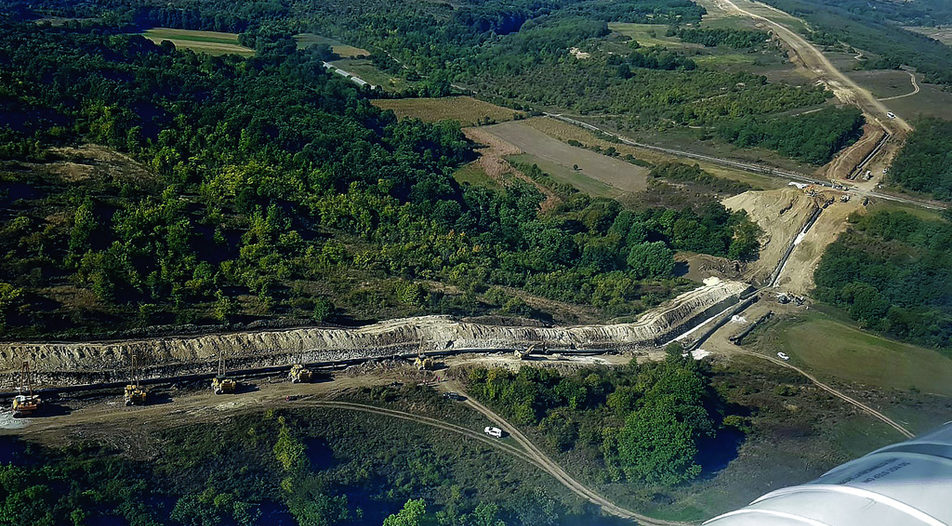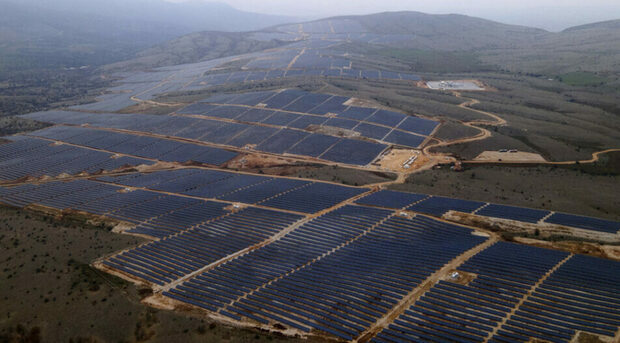After numerous attempts to name the continuation of the Russian "Turkish Stream" gas pipeline through Bulgarian territory as "Balkan Stream", Prime Minister Boyko Borissov is in a ridiculous situation. In early October, Francis Fannon, Assistant Secretary of State in the Bureau of Energy Resources at the US State Department, who was on an official visit to Bulgaria, said that, as far as Washington is concerned, "Balkan Stream" is actually a continuation of "Turkish Stream" and serves entirely Russian interests. A week later, in a report to investors, Gazprom also presented the Bulgarian gas pipeline as part of Turkish Stream.
Borissov's theatre of attempted distancing from Russia now seems farcical as a consequence. So the Bulgarian prime minister tried to quell the scandal in typical style - by a helicopter tour of the construction sites of the pipeline, accompanied by the Deputy Minister of Saudi Arabia, who claimed that it was the Saudi company Arkad that was the executor of this project "for the expansion of the Bulgarian gas transmission network".
This turned out to be another blunder, as it became clear that although the formal contractor of the project is indeed the Saudi consortium Arkad, the real builders of the pipeline and suppliers of the pipes are Russian and Belarusian companies. In fact, for almost BGN 3 billion of Bulgarian taxpayers' money, the government is letting the Russians build a pipeline for Russian gas, by Russian companies and Russian managers, and using Russian pipes.
However, so far there is no definite US decision to impose sanctions on the gas pipeline through Bulgaria, although it is certain that the US authorities are fully aware of Borissov's dependence on Moscow. "We do not want to sanction anyone. And we definitely don't want them to be our partners and friends. Our goal is to make the other side (Russia) change its behaviour," Assistant Secretary Fannon told Bulgarian journalists.
Russian Stream and nothing else
"We consider "Balkan Stream" as a continuation of "Turkish Stream" and for us the name does not change the fact that Russia uses this project for political influence," said the American diplomat, who, by the way, did not have a formal meeting with Prime Minister Borissov, and saw only the Minister of Energy Temenujka Petkova.
Although initially there were only suspicions that Russia was building and financing the gas pipeline through Bulgaria, now this is confirmed by documents in the Commercial Register. And Fannon's words gain even more weight.
From the financial report for 2019 of "Completions Development SA - Branch Bulgaria", owned by the Luxembourg company "Completions Development", which was a competitor of Arkad in the tender for the continuation of "Turkish Stream" through Bulgaria, it can be seen that it was the supplier of the pipes for the pipeline. The company has announced income of 299 million levs, which stems entirely from a contract for the supply of pipes with the two companies in the Arkad consortium - "Arcade Engineering and Construction" and "Arcade" S.P.A.
Significantly, the final owners of "Completions Development SA - Branch Bulgaria" are two subsidiaries of the Russian TMK (Pipe Metallurgical Company) - TMK Holding and TMK Steel Holding. Specifically, TMK is also mentioned in the report as a manufacturer and supplier of the pipes. In fact, this was predicted on February 26, 2019, by the Russian publication RBC (rbc.ru), which announced then that Gazprom had chosen TMK for the pipes for the gas pipeline through Bulgaria. At that time, the formal procedure for selecting a builder of the gas pipeline from the Turkish to the Serbian border was still at the stage of collecting bids, and the names of the candidates became clear on March 7, 2019.
The fact that the pipes for the continuation of "Turkish Stream" in Bulgaria were ordered, paid, manufactured and delivered (their storage at the ports of Burgas and Varna began in July 2019), even before the signing of the contract with the Saudi consortium Arkad (in late September 2019), clearly proves that the Bulgarian state has agreed on the project directly with Russia(probably at the meeting between Boyko Borissov and Vladimir Putin in mid-2018). And all the formal procedures were carried out only to hoodwink Brussels into believing that everything is legal and transparent.
The Arkad facade
Available documents also make it clear that the Saudi consortium Arkad, which formally won the contract for the construction of the Turkish Stream through Bulgaria, is no longer managed by the Saudis. Initially, the consortium was represented by Hani Ali Abdul Latif Abdul Hadi, but the contracts published this year on Bulgartransgaz's website show that the Russian Yuri Shvetsov is signing.
Officially, he works as a director of the Arkad consortium, and in this position in the spring, he even had an official meeting with the regional governor of Lovech, Vanya Sabcheva, in connection with the passage of the gas pipeline from there. Due to the lack of more details, it is difficult to specify Shvetsov's biography but it is curious that a man so named is a longtime employee of Gazprom, and called a "veteran" of the company in the Russian media.
More importantly, February 2020 saw a significant change in the main company in the Arkad consortium - "Arcade Engineering and Construction". The Saudis have literally withdrawn from it, and the company is actually being run by Russian citizen Nikolai Ilyushchenko. He was appointed to replace Muhanad Shaker, and was given full authority to manage the Bulgarian company Arcade Engineering and Construction, which is a branch of the company with the same name, registered in Saudi Arabia.
It is clear from the power of attorney that the Saudis have completely transferred the company's activities into the hands of Ilyushchenko, even allowing him to conclude "any contracts", "to have full power over any bank accounts", as well as to "negotiate and conclude contracts for a loan or other contracts for the provision of financing, as well as related collateral and other contracts, amounting to 400 million euro"
In other words, the Saudis, whom Bulgaria allegedly chose to build the pipeline, have transferred all their business in the country to Russians, directly related to Gazprom, which will be the only one to use Turkish Stream.
The Secret Builders
The arrival of the Russians in Arkad led to a number of subcontracts. Within two months - from April 16 to June 5, 2020, 8 subcontracts of the Arkad consortium were signed, which were not announced in the initial offer of the Saudis. The hired companies are mostly Russian.
From the very beginning, there were doubts that Arkad would be used as a facade builder, as there is no equipment and people available in Europe. The first confirmation of this came in February 2020 when the Serbian online media eKapija announced that the Belgrade-based Russian company IDC (Infrastructure Development and Construction), which built the Turkish Stream section through Serbia, would also be hired for the Bulgarian section of the pipeline.
This information was then refuted by the state-owned company Bulgartransgaz, but on April 14th a subcontract agreement was signed between Arkad and IDC. This has not been announced publicly, only the documents are available on the Bulgartransgaz website.
In Bulgaria, the branch of IDC - "Infrastructure Development and Construction" was registered on December 3, 2019. More significantly, the real owner of the Bulgarian company is the Russian concern Gazprom.
A Russian company, SPK, which worked with IDC on Turkish Stream in Serbia, has also been hired to work on the Bulgarian pipeline. The company became famous with the making of the last so-called gold weld of the first pipe from "Turkish Stream". On the internet site of SPK, whose director is Alexei Bachin, it is clearly mentioned that the company is actively involved in the construction of the Turkish Stream gas pipeline through Bulgaria - the companies, which are part of the group SPK West and SPK Magistral, are working on a 30-km section between Zlatina and Sechishte.
Another subcontractor that actually builds the Bulgarian gas pipeline is the Belarusian company - Beltruboprovodstroy. It was hired specifically to run the pipeline under the Yantra River, and it is curious that last year Lithuania did not allow Beltruboprovodstroy to participate in the construction of a 165-kilometre gas pipeline to Poland. The local authorities maintained that the Belarusian company could threaten national security. The Lithuanian State Security Department has officially announced that Beltruboprovodstroy has ties to the Russian companies Gazprom, Stroytransgaz and Rosneftegazstroy.
Nevertheless, the Bulgarian authorities are doing everything possible to ensure the smooth completion of this project, which will inevitably strengthen Russian domination not only in the country but also in the region.
After numerous attempts to name the continuation of the Russian "Turkish Stream" gas pipeline through Bulgarian territory as "Balkan Stream", Prime Minister Boyko Borissov is in a ridiculous situation. In early October, Francis Fannon, Assistant Secretary of State in the Bureau of Energy Resources at the US State Department, who was on an official visit to Bulgaria, said that, as far as Washington is concerned, "Balkan Stream" is actually a continuation of "Turkish Stream" and serves entirely Russian interests. A week later, in a report to investors, Gazprom also presented the Bulgarian gas pipeline as part of Turkish Stream.
Borissov's theatre of attempted distancing from Russia now seems farcical as a consequence. So the Bulgarian prime minister tried to quell the scandal in typical style - by a helicopter tour of the construction sites of the pipeline, accompanied by the Deputy Minister of Saudi Arabia, who claimed that it was the Saudi company Arkad that was the executor of this project "for the expansion of the Bulgarian gas transmission network".












